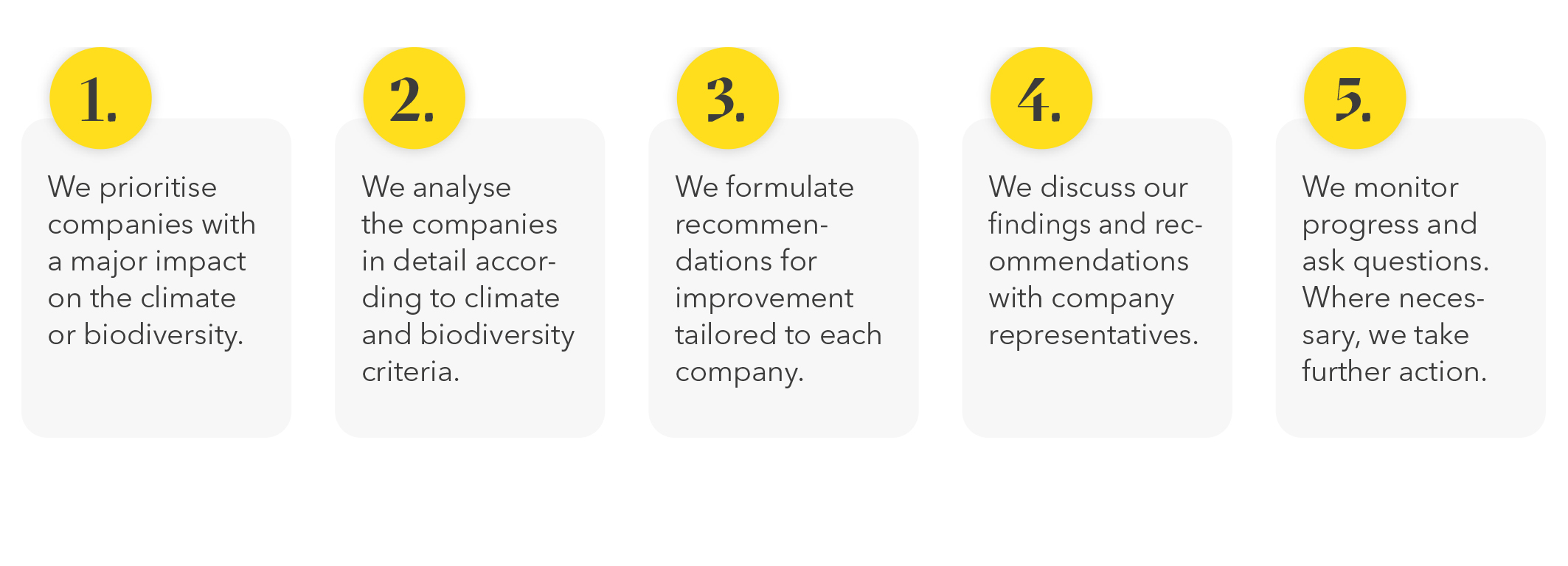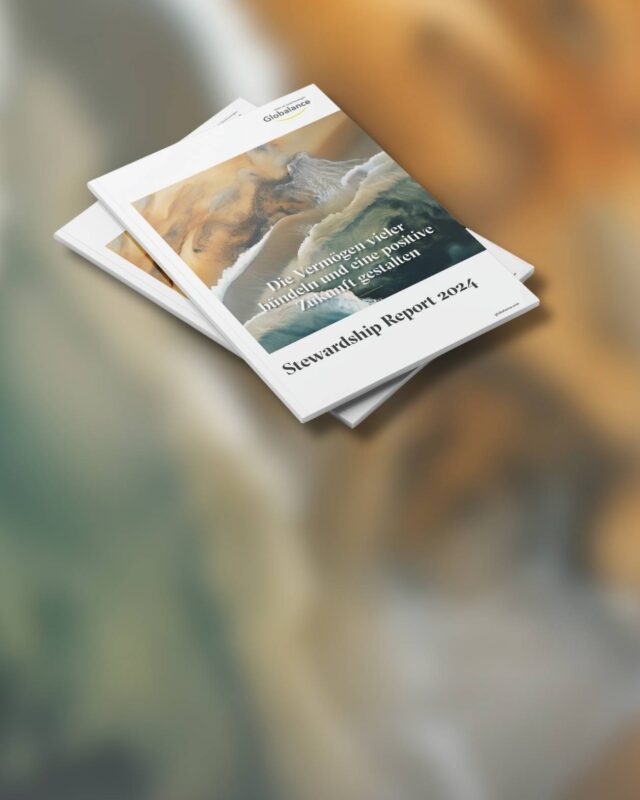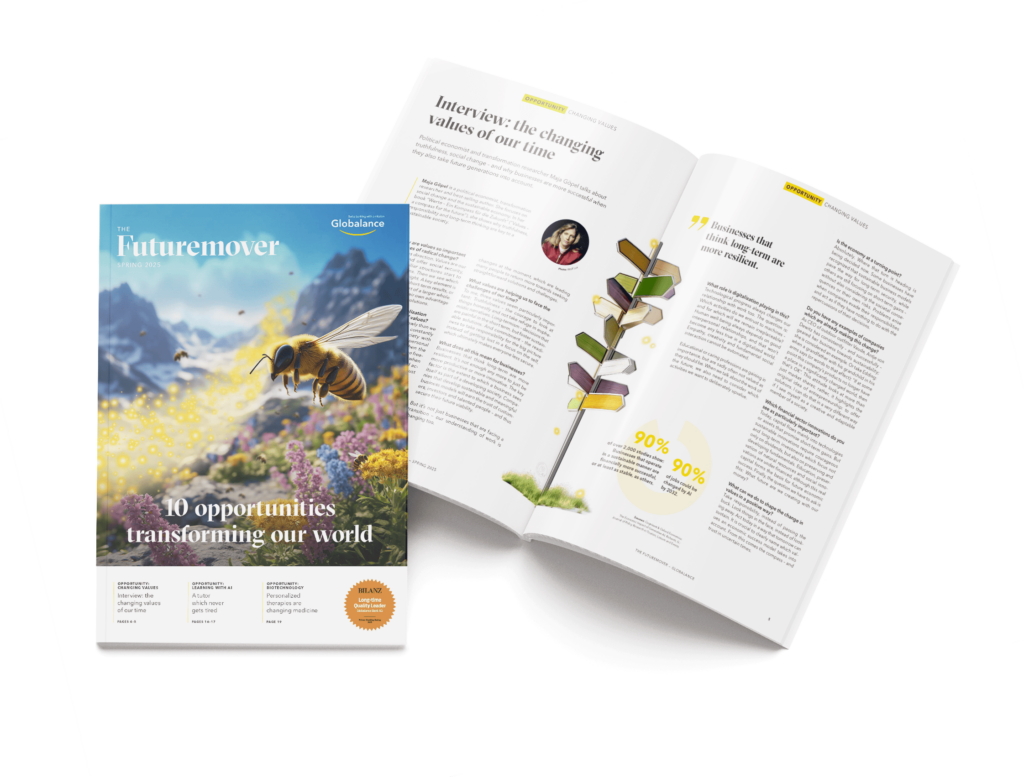
This is how we proceed
Shareholder Engagement
Shareholder engagement involves shareholders or asset managers entering into a direct dialogue with companies. The focus lies on challenges in the areas of governance, society and the environment. At Globalance, we conduct dialogues on the topics of climate, biodiversity and human rights.
Our Engagement in Five Steps
In our dialogues with our portfolio companies in 2024, we focused on three topics: climate, biodiversity and human rights.
• Climate: We analysed companies with a relevant impact on the climate on the basis of five criteria: greenhouse gas reporting, greenhouse gas reductions already achieved, greenhouse gas reduction targets, measures to reduce greenhouse gas emissions, climate governance.
• Biodiversity: We use our new biodiversity data from Iceberg Datalab, which considers the whole value chain of companies to identify the companies for which biodiversity loss is a relevant topic. Our recommendations focus on the use of resources, as this is where most companies have the greatest potential to operate in a more biodiversity-friendly manner
• Human rights: In the past, we have held individual discussions with companies on the topic of “human rights” when material controversies arose. In 2025, we will give the topic of “human rights” more weight and address it systematically.

Criteria for our Climate-Analysis
Greenhouse Gas Reporting
- Are the relevant emissions published?
- Are the published emissions verified by a third party
Greenhouse Gas Reduction
- Has the company already achieved relevant emission reductions in the past?
Greenhouse Gas Reduction Targets
- Does the company have ambitious emission reduction targets?
- Are the relevant emission sources part of the targets?
Measures to Reduce Greenhouse Gas Emissions
- Are specific measures to achieve the announced targets published?
Climate Governance
- Is the topic of climate under the supervision of the Board of Directors?
- Is there a person with climate expertise on the Board of Directors?
- Is management remuneration linked to the communicated climate targets?
Our Escalation Steps
- Raising the matter with the board of directors
- Cooperating with other investors
- Voting against members of the board of directors (e.g. against the chairperson or members of the sustainability committee)
- Presenting the issue at the Annual General Meeting
- Submitting a shareholder proposal
- Divesting
Company Dialogue – Climate Case Studies
Best Buy: Greater Transparency Needed on Climate Measures
The situation
The US retailer Best Buy is pursuing ambitious climate targets at operational level. However, 90 % of the company’s total greenhouse gas emissions come from energy consumption during the use of electronics and household appliances. Best Buy can reduce these by selling more energy-efficient appliances. Regarding these emissions, the company is aiming for a 20 per cent reduction by 2030.
our Concern
We are demanding greater transparency regarding the assumptions this goal is based on. Are products with high energy consumption actually being removed from the range or is the company simply hoping that customers will increasingly run their appliances on renewable electricity? We expect Best Buy to explain how the company is committed to the development of energy-saving appliances and to promoting their sale through appropriate measures (e.g. targeted marketing and product placement).
Interim Results of the Dialogue
Best Buy has developed internal measures for tracking its climate progress. Energy efficiency is measured for all product categories. Little has been published on either topic to date. Globalance continues to advocate for more meaningful communication and disclosure.
Amazon Plays by Its Own Rules in Its Emission Reporting
the situation
So far, Amazon has only reported emissions from the value chain of its own branded products. There is therefore no information on emissions from all other products sold on the Amazon platform. Both online and brick-and-mortar shops, are responsible for the emmisions of the products they sell. Even if Amazon does not cause the emissions directly, the company must take responsibility for them. This is important because shops and online platforms can strongly influence customer purchasing behaviour: they decide what appears first in searches, which products are advertised and how strongly sustainability aspects are emphasised.
our Concern
We demand that Amazon reports in accordance with best practice, takes the responsibility and power of an online platform seriously and contributes to reducing the emissions of the products it sells. We are not alone in this demand: a shareholder proposal was submitted to the 2024 Annual General Meeting calling for full greenhouse gas reporting.
Interim Results of the Dialogue
Amazon defends its own emissions reporting, but the corresponding explanations were not satisfactory. We will keep on its case.
Novo Nordisk’s impact on nature
The situation
The most significant negative impact of pharmaceutical companies on nature occurs after patients have taken their medication: Substances that are not absorbed by the body are released into nature via wastewater, where they have a negative impact on living organisms. For example, ingredients in hormonal contraceptives can feminise male fish and impair their reproductive capacity.
Our Concern
Globalance asked Novo Nordisk whether the impact of the pharmaceuticals it sells on the environment is measured. We were also interested in whether Novo Nordisk takes environmental risks into account as early as the design phase of the medicines and analyses legacy pharmaceuticals for environmental risks.
Interim Results of the Dialogue
Most of the medicines produced by Novo Nordisk are biodegradable – which is encouraging. For this reason, the company has not yet considered the criterion of ‘water pollution’ during the design phase. However, other environmental aspects, such as CO2 emissions, already play a role in the design phase.
We have drawn Novo Nordisk’s attention to Astra Zeneca’s transparent communication in the risk assessment of all the pharmaceuticals under review and explained that we would like to see the same transparency from Novo Nordisk.
We analyse portfolio companies for their impact on the environment and health and write to the companies with tailored recommendations for improvement.



